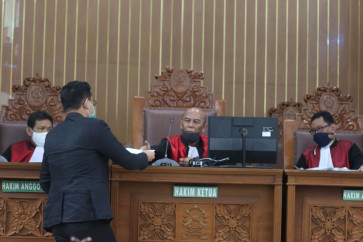Popular Reads
Top Results
Can't find what you're looking for?
View all search resultsPopular Reads
Top Results
Can't find what you're looking for?
View all search resultsLawyers and the fight against ethical ambiguity
Assisting a client in wrongdoing may expose the lawyer to some liability. A lawyer who does not choose to accept that risk has sufficient grounds to refuse the client's request or cease working for the client, even if this action ends up harming the client’s interest.
Change text size
Gift Premium Articles
to Anyone
 No show: The lawyer for fugitive and graft convict Djoko S. Tjandra, Andy Putra Kusuma (second left), speaks to presiding judge Hakim Nazar Effriandi at the South Jakarta District Court on July 20. The lawyer asked for a delay to the hearing of Djoko’s case review motion due to the latter’s illness in Kuala Lumpur. (JP/Dhoni Setiawan)
No show: The lawyer for fugitive and graft convict Djoko S. Tjandra, Andy Putra Kusuma (second left), speaks to presiding judge Hakim Nazar Effriandi at the South Jakarta District Court on July 20. The lawyer asked for a delay to the hearing of Djoko’s case review motion due to the latter’s illness in Kuala Lumpur. (JP/Dhoni Setiawan)
I
n a democratic society, everybody has a right to a fair trial and people have a right to counsel. The state will allow them to have a lawyer if they can find one they can afford. Every suspected terrorist, mass murderer or corrupt official needs a lawyer.
But, how do you defend a person who you know is guilty? Some lawyers think of themselves like a doctor. If a patient enters the emergency ward, the doctor will take care of him or her. A lawyer does not defend a crime, but a criminal. Their defense is not an endorsement of those crimes.
According to Law 18/2003 on advocate, lawyers are also law enforcers. This idea highlights a very important dual role that lawyers serve that a lot of people tend to forget, especially clients. Lawyers do not represent clients’ interests at all costs. There are certain things that lawyers are not allowed to do, even if it is in the interest of their clients.
When Djoko Tjandra returned to Indonesia, he did so as one of the most wanted persons. The fugitive tycoon acquired a new ID card and passport, filed a case review and traveled around the country, before disappearing again.
What about his lawyers who defend him? I am sure they are committed to their role to protect their client’s rights. Perhaps they see their client as a human being in a difficult situation, who might or might not have made a mistake and find himself being churned through the machinery of our criminal justice system. In this case, if the lawyer fails to respond to the media’s questions or the society’s accusation, then the lawyer will be accused of “hiding” the client. Lawyers cannot please all parties, nor should they try. These are the problems that only lawyers can appreciate.
With lawyers, there are ethics. The Honorary Council or Dewan Kehormatan of the advocates association is responsible for making sure that lawyers play by the rules, and those rules are Law 18/2003 and the Advocates Ethics Code (code). Both prescribe conduct that is expected of lawyers in their relationships with the client, the public and the legal system. There is no ambiguity in either document that a lawyer may not counsel his client to engage in a crime or fraud and may not assist the client should the client chose to do so.
However, the code does not specifically prohibit a lawyer from counseling or assisting a client to engage in a wide variety of misconduct that is not criminal, fraudulent, or otherwise prohibited by the code.

















